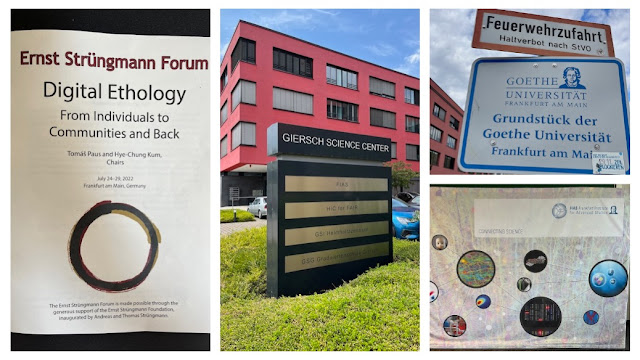2022-08-03: Ernst Strüngmann Forum on Digital Ethology Trip Report
Julia Lupp, Director of the Ernst Strüngmann Forum, describes these events as more of an "intellectual retreat" than a conference. Typically, about 40 scholars and experts from various fields are invited to spend a week in discussions around various aspects of a common topic. Results of the discussions are later published in book form (and online) by MIT Press through the Strüngmann Forum Reports.
The forum on Digital Ethology was chaired by Tomáš Paus and Hye-Chung Kum. The aim of the forum was to "explore how digital ethology — the study of human behavior as captured by its digital footprint — can be used to quantify the human environment and facilitate understanding of its impact on health and well-being."
The 30 participants were divided into four groups around the following themes:
- Group 1 - How Concepts of Ethology Can Be Applied to Large-Scale Digital Data
- Group 2 - Quantifying and Geocoding the Physical and Built Environment
- Group 3 - Quantifying and Geocoding the Social Environment
- Group 4 - Integrating Knowledge from Individual- and Aggregate-Level Data
Before the forum, several participants were asked to write background papers (two per group) that served to set the stage for the discussions. These papers along with reports from each group will serve as the chapters for the forthcoming book.
I was assigned to Group 3 and was asked to serve as our group's rapporteur. My job consisted of capturing the essence of our group's discussions and crafting the first draft of our group report. I was joined in Group 3 by José Balsa-Barreiro (NYU Abu Dhabi), Nitesh V. Chawla (Notre Dame), Tamas David-Barrett (Oxford University), Jason Gilliland (Western University) who served as our moderator, Maria Melchior (French National Institute of Health and Medical Research), and Abeed Sarkar (Emory University).
- How can we describe the social environment?
- What phenomena can be studied using social media data?
- What does representativeness mean in the world of digital data?
- How does context (physical proximity, history, culture) affect social behavior?
- What does ethology mean in the metaverse?
The discussion sessions were scheduled such that only two groups met simultaneously, allowing members of the other groups to sit in on discussions of their choice, providing additional perspectives that greatly enhanced the experience.
On Thursday, each group met to summarize the discussions from the previous days and finalize plans for the rough draft of the report. In the afternoon, the rest of the participants had a free afternoon while the four rapporteurs (including me) worked on the draft. All of the draft reports were submitted by 9pm so that they could be distributed to all participants for review on Friday morning. The final day was focused on providing feedback on the group reports and developing action items for completing the reports over the next six weeks.
Now that I've described the general agenda, I'll try to describe the experience. This was much different than a conference. There were no prepared talks or slides, just a continuous exchange of ideas and stories. The format and logistics themselves were conducive to helping us quickly build connections with each other. We were a relatively small number of people spending all day together for a week, with COVID protocols such that we were almost in a bubble. We ate all of our meals together, rode the bus together between the hotel and the Institute, and socialized together in smaller groups in the evenings. It was lovely. I don't know that faculty get the opportunity to attend venues like this very often. I likened it to summer programs I'd participated in as a graduate student. It was a very special experience. I hope to be able to stay connected with my Group 3 colleagues even after we've completed our report.
Many thanks to Julia and the other staff members and assistants for facilitating such a unique experience, to Tomáš and Hye-Chung for framing an interesting topic, and to all of the participants for the engaging and thoughtful discussions. Personal thanks to Hye-Chung for inviting me to participate!
-Michele


Comments
Post a Comment